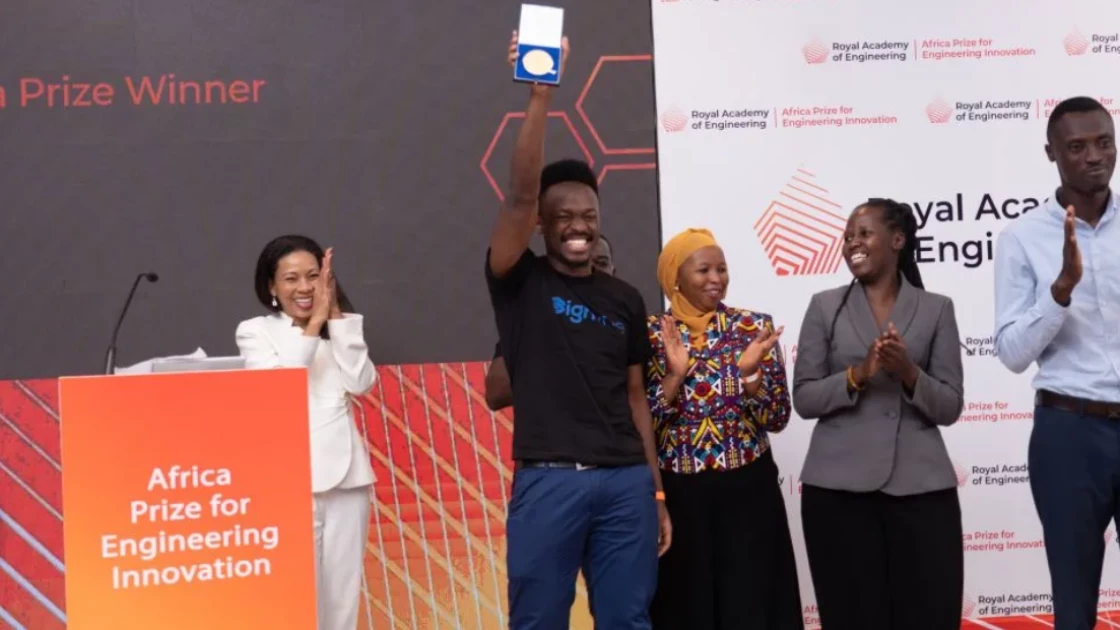Kenyan AI app turning speech into sign language wins African award

Elly Savatia won this year's Africa Prize for Engineering Innovation for his app Terp 360. - Royal Academy of Engineering

Audio By Vocalize
A Kenyan startup that develops an artificial intelligence-powered app translating speech into sign language in real-time has won a prestigious African innovation award.
Elly Savatia, the founder of Terp 360, was on October
16 awarded £50,000 (about Ksh. 8.7 million) by the UK’s Royal Academy
of Engineering after emerging as the winner of this year’s Africa Prize for
Engineering Innovation, an accolade that recognises technologies tackling
pressing challenges across the continent.
Speaking to CNN, Savatia described his creation as “Google
Translate for sign language”, explaining that the web-based app uses 3D
avatars to provide instant sign language translations from speech or text —
allowing smooth communication between hearing and non-hearing individuals
without relying on human interpreters.
“To go to the workplace, education, health care, you have to
communicate,” Savatia told CNN. “But the deaf community, they’re left behind.”
Developed in collaboration with Kenya’s deaf and
hard-of-hearing community, Terp 360 has recorded more than 2,300 signs —
including commonly used words and phrases — using motion sensors that track the
movements of a signer’s hands. The platform currently supports translations
from English and Swahili into Kenyan Sign Language, with plans to expand
into other African and global sign languages by mid-2027.
“Companies cannot afford interpreters… and they just don’t
have the tools to effectively integrate these people,” Savatia said. “We see
ourselves as an enabler. We are able to do sign language, but at scale.”
According to Rebecca Enonchong, chair of the prize’s
judging panel, Savatia’s innovation stood out for its social impact and
technical ingenuity.
“What really stood out about Elly’s solution, and Elly
himself, is the level of innovation. It was really a demonstration that
Africans are capable of using cutting-edge technology to solve problems, not
just on the continent but beyond,” she stated.
Enonchong added that the judges were particularly impressed
by Terp 360’s potential to empower millions of deaf Africans who struggle to
access education, healthcare, and employment opportunities due to communication
barriers.
“One of the criteria we use to judge is social impact. Assistive
technologies are one of those areas that are underserved — not just on the
continent, but in the world,” she said.
Savatia says his team has already set up a motion capture
studio in Nairobi capable of recording up to 1,000 words a day, and
plans to partner with NGOs, sign language projects, and media houses across
Africa to help train the AI in new languages.
Kenya’s Persons with Disabilities Act and recent government
directives require employers to reserve at least 5% of jobs for people with
disabilities, but Savatia notes that without accessible communication tools,
such policies remain difficult to implement effectively.
“We’re trying to make it possible for deaf people to
participate fully — in classrooms, hospitals, and offices — without needing to
wait for an interpreter,” he said.
The Royal Academy of Engineering’s Africa Prize for
Engineering Innovation was launched in 2014 to celebrate and support
African innovators using engineering to solve local and global challenges.


Leave a Comment